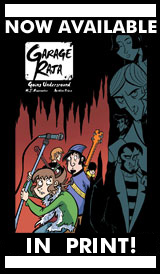Broken Stories
Where the devil did all of the hype for Bill Willingham’s Fables come from? Hailed as “the best comic book currently being produced,†by IGN, winner of fourteen Eisner Awards and hailed by many as the second-coming of Neil Gaiman’s Sandman, Fables has entered the contemporary canon of comics. Rather wrongly, given that the series is nothing exceptional. This is not to say it is BAD. While it is a fundamentally flawed piece of work, rife with rotten characterization, clumsy plotting, a real lack of focus and squandered potential, it is never horrible.
By the same token, though, the story only rarely ever manages to rise above the merely adequate. Because for all of his insistence that the series is about magic and the power of storytelling – even going so far as to suggest that our world might be the most magical of all for its denizens ability to shape all others – Bill Willingham’s approach to writing drains this story of any kind of wonder. He fails to realize that fables have a universal, timeless appeal because they are cardboard cut outs, archetypal symbols devoid of nuance and character that anyone can understand. Willingham is too eager to humanize these characters, investing them with modern, urban sensibilities and nuances, and so robs them of their universality – and consequently, their power. Pinnochio as the perennial sexually frustrated youth might have worked to update the story and comment on contemporary conceptions of adulthood and boyhood, but Willingham is quick to admit that the character is, “a one joke premise,†that he keeps him around because “there’s something that’s always going to be funny about little kids cussing and doing adult stuff (Footnote 1).†Meanwhile, Bigby Wolf, the platonic Big Bad Wolf and the story’s first protagonist, reads like one of the more uninspired Raymond Chandler detectives, snarling and snapping and scowling his way through the earlier story arcs before he is forcibly shunted into an unconvincing a relationship with Snow White. One might think that there’s some symbolic significance to their relationship, since it lacks any chemistry and is thrown together by a plot device, but no, there’s nothing of the sort.
Which begs the question: why? Why use these characters at all if they are going to be stripped of their major functions? They are not, as established, supposed to be deep characters, so that cannot be the reason that Willingham has picked them.  And he only seems nominally interested in exploring the nature of storytelling and consensus reality; despite his insistence that this is the major theme of the book, this mystery about the origins of Fables and the effect of our world on them, he has only addressed this issue a handful of times and always in pseudo-theoretical asides. In light of this, Willingham’s decision to grant these characters nuanced (well, relatively so. None of the characters are particularly well developed. Only Flycatcher, the Frog Prince; Rose Red, Snow White’s sister and Frau Totenkinder, the witch from the Grimm Brothers’ fairtyales, ever really make significant and believable strides as characters. Making Boy Blue a hateful cynic after he’s spurned is not exactly grand writing, and turning Prince Charming into a womanizer with a hidden layer of nobility is so contrived that it hurts) personalities seems poorly made. What he has made are, effectively, parodies of classical characters, if that. They bear so little relation to their inspirations that it is often hard to trace lineage.
The problem is that Willingham is one of these writers who claim they are interested solely in “telling good and interesting stories,†which is the excuse of the writer who finds the ideas of rules, structure and theory an impediment (Footnote 2). But the entire point of such rules is to strengthen one’s writing, to take out all of those asides which detract from the central thrust of the story and to keep a narrative focused. It is in the absence of these restraints that a writer, feeling most free, often loses direction. Which is exactly what has happened with Willingham. He picks up topics only when they remain interesting to him and drops them when they can no longer hold his focus. It is why Fables loses absolutely all steam when Willingham concludes the war with the Adversary: after he gets done beating readers over the head with his bizarre take on Zionism (Footnote 3), he moves attention to the story of Mr. Dark, a villain who is supposed to represent elemental evil but is so drat dull that the only fear he inspires is that of his continued presence. It is clear that Willingham knows this, because not only does he spend a significant amount of each issue focusing on no less than four separate and unrelated subplots (Rose’s coming to grips with her terrible behavior, Buffkin’s rebellion in Oz, Gepetto’s growing political influence, the birth of Beauty and Beast’s daughter), hesees fit to interrupt the Mr. Dark storyline mid-action to dwell for thirteen odd issues on a plot thread he had introduced, and promptly dropped, some 40 odd issues ago. One might object that because the Literals story arc, which was only hinted at in the person of Kevin Thorn in very early issues of Fables, is more fully developed in the spin-off Jack of Fables it does not come out of nowhere. But this simply goes to prove my point: if Willingham’s writing predisposes him to interrupt a major storyline in order to wrap up a side-plot he once deemed unfit for the central story there is something fundamentally flawed with it. His decision to end the Mister Dark storyline so abruptly and anticlimactically does not bode well for any positive changes, sadly (Footnote 4). All it does is further complicate the plot by giving the Fables a new and particularly uninteresting antagonist and pushing Bigby and Snow’s children to a position of undeserved prominence.
It’s a shame that Willingham is so eager to waste talent. The man is not some simple hack.  In fact, when pressed he is quite capable of moving writing. In “The Good Prince,†Willingham develops the nearly-nonexistent character of Flyctacher quite convincingly into the tragic, noble leader of a new utopia that may be doomed even as soon as it begins. Meanwhile, the character of Rose Red, though she begins as little more than a stand-in for every woman who’s ever broken Willingham’s heart (Footnote 5), changes so convincingly as a result of this that Wilingham’s initial vitriol almost becomes justified. Both of these plots manage to elevate the characters beyond their neuroses, their all-too human dimensions, and involve them in the sort of legendary exploits that befit these archetypal characters. When Willingham stops trying to juggle a million plotlines, lay down his clumsy political philosophy or add an edgy, human dimension to these characters (Footnote 6), he really is capable of some solid work.
The problem is that Willingham is much more interested in amusing himself and proving just how clever he is (Footnote 7). He does not care that he is wasting a perfectly fine idea or the considerable artistic talents of Mark Buckingham (Footnote 8) or that he has taken a particularly interesting idea and made it a gimmick that, when not properly utilized, only serves to distract.  When these characters fail to conform to anything resembling type, when they’re throwing around hopelessly out of place references to drugs and sexual positions and casual murder, the entire thing becomes so jarring and alienating that one has to ask why: why even appropriate these characters and “develop†them if they’re just going to end up like normal people? If Wilingham really is, as he suggests, interested in exploring how stories work and how the reader’s interpretation can alter them, then he would be best served focusing on his reader and not himself. He should reacquaint himself with some of the basics of plotting and pacing and structure, and should settle on a definite direction for the series. Otherwise, Fables will continue on in the same awkward, loping way it has for years, its potential eternally unfulfilled.
____________________________________________________________________________________________________________________________________
Footnote 1: These quotes come courtesy of an interview with Willingham posted in the October issue of Midnight East (midnighteast.com/mag/?p=1933).
Footnote 2: Thanks again to Midnight East for the interview, which provides this little quote.
Footnote 3: Though Willingham claims in an interview with that Bigby’s  commentary on Israel was not indicative of his own, he has also claimed, in an interview with Deppey  Dirk of the Comics Journal, that “politically, I’m just rabidly pro-Israel and so that, as a metaphor, was intended from the beginning.â€Even his excuse that the analogy was only to showcase what, exactly, he had in mind for the coming war holds no water. His protest that it was “a good analogy…(because) everyone understand what it means,â€Â likewise fails. Yes, one might understand what the analogy is supposed to mean, but if it is built on over simplification and faulty premises and deliberate misrepresentation, it is hard to call it good. The fact that he claims there are several parallels between the Fables’ and Israel’s situations is laughable. Maybe if the Fables were fighting the New Yorkers they had displaced from their homes when they decided to set up shop in our world it would, but instead, they’re hiding out in a spot of land they created out of thin air and which the New Yorkers literally cannot perceive. Their enemy is a giant, imperialist warmachine, not a coalition of the displaced backed up by a number of economically middling nations. Putting these words into the mouth of Bigby Wolf, a character who has literally made his living devouring much smaller, weaker creatures, does nothing but provide an alienating layer of hypocrisy.
Footnote 4: I am aware that Willingham is attempting to say something about the outdated model of superhero narratives with the rather abrupt defeat of Mr. Dark’s  defeat at the hands of the Northwind instead of at the hands of Ozma’s super-team, and that the development allows for some progression for Bigby’s children, but this conclusion is the very definition of anti-climactic. In just pages, Willingham renders years’ worth of storytelling superfluous, all of the tension until that point feels cheap, and it jeopardizes any chance that the reader will trust him in the future when he presents them with another seemingly tense situation. When a writer relies on the smokescreens of “meaning†and “intent†to cover up for a lazy undermining of narrative structure, he pays himself no compliments.
Footnote 5: There’s a particularly embarrassing bit in volume 12 where a dying Boy Blue decides to berate Rose Reed for spurning his affection. He gives her this massive lecture about the “friend zoneâ€,  about how girls prefer bad boys, and about how spiteful he is about all of this, all on his deathbed. They sound less like the final words of a quasi-immortal swashbuckler who has nearly ended multiversal war twice and more like the bitter rant of some message-board bound goon who’s had hisheart broken one too many times.
Footnote 6: This is one of my biggest complaints with Fables: Willingham thinks that if his characters are talking, they need to lace their dialogue with sexual innuendos and profanity. It’s notuncommon to find abstract entities referring to other characters as “fucktards;†in one instance, Santa’s reindeer discuss, in the parlance of frat boys, whether or not Santa Claus is having an affair with Rose Red. It’s a tasteless, stupid and ugly little tic that does nothing to develop the characters at play and istoo forced and bizarre to provide comedy. Again, Willingham’s insistence on amusing himself in pursuit of “telling a good story†does nothing but betray him for a selfish and short-sighted writer.
Footnote 7: There are two moments that exemplify this more than anything. The first is when the reader has been led to believe that a corrupt vizier’s plans to use a Djinn to destroy the other Fables will be successful. As it turns out, he ends up wishing for his own demise. How? Because Frau Totenkinder, leader of Fabletown’s witches, changed the words coming out of the Vizier’s mouth.It’s a cheap, throw-away, smirky little twist that squanders suspense and a possibly exciting climax so that Willingham can just say “GOTCHA! Bet YOU wouldn’t have thought of that!†The second time concerns The Adversary’s war plans, which initially center around poisoning Earth viamagic and slowly whittling away the native inhabitants before launching the combined forces of the Empire at Earth. The dismissal, by way of Pinnochio, reads like Willingham is addressing all those readers who puzzled over this very question: how come an empire thousands of worlds strong, with access to magics that literally render many of its billions of soldiers invincible, invisible and superhuman, and a bevy of literal gods and demigods, would have any trouble taking down a world as divided and unprepared as our own? It is not, as Willingham hints at earlier, because our world is the world that influences and shapes all of these others through the power of storytelling (a theme he’s neglected to develop ); no, the reason they fear invading us is because America would, with the help of the Fables,invade the Empire and murder everyone in their way. It’s not a clever answer, but Willingham delivers it with such smug self-satisfaction that it’s hard to picture Pinnochio as anything more than his mouthpiece.
Footnote 8: His art is, at least, a consistent reason to read Fables. It might not be astounding, but itsolid in a way that few other artists’ work is. Though the colorist could do with a change. There’s something about the colors, which look paradoxically both washed out and all too bright, that irritates the eyes.






